Just after the Qingming Festival holiday, many parents must have taken their children out for a hike.
After the festival, many friends around me complained that it was really difficult for my wife and wife to take the children who had just learned to walk out to play.
They have clearly learned to walk, but they always want their mother to hug them!
The same is true of my youngest son.
When he was about to go home and climb the stairs, he specially transferred the two bags in my hand to my father’s hand. At first, I thought I was distressed. Just as I was about to be proud, Eva said expectantly:
[Mother Hugs ~]
My God, this routine is too deep!
Why does the child have to be hugged by his mother when he can clearly leave?
One hug from the mother can give the child more security.
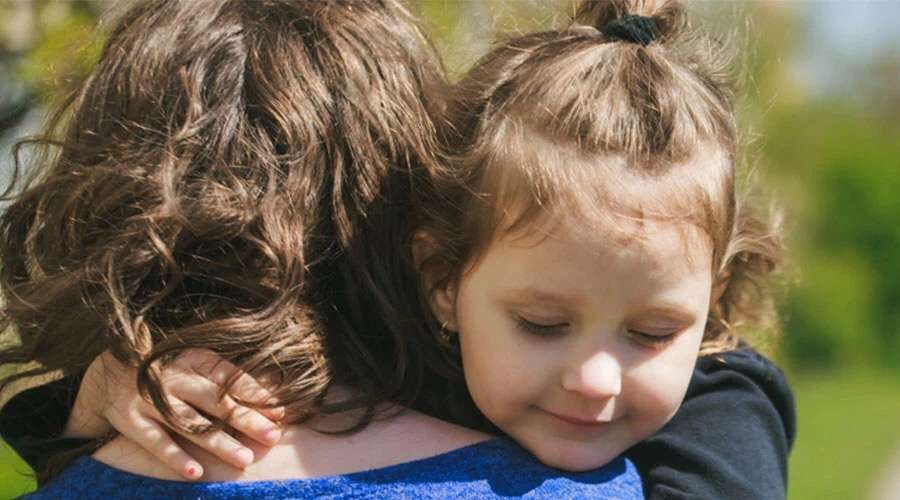
Psychologists have found that people are born with the psychological need to seek intimate touch.
Studies have shown that even on the skin the size of a 5-cent coin, there are 25 meters of nerve fibers and more than 1,000 nerve endings.
Embracing children and touching their skin can provide them with the [psychological nutrition] they need.
This kind of nutrition is especially important when children are young.
When children lack hugs for a long time, their skin will be in a state of hunger and thirst.
If the child is crying and clamoring for your hug, don’t be stingy with your arms, just open your hands and hug the baby.
They are not playing coquetry or nonsense, but just want to find more comfort from their mother’s arms.
A timely embrace can not only help the child’s mood gradually restore calm, but also fill the child’s inner sense of security.
[To hug], it is the child who is eager for attention.
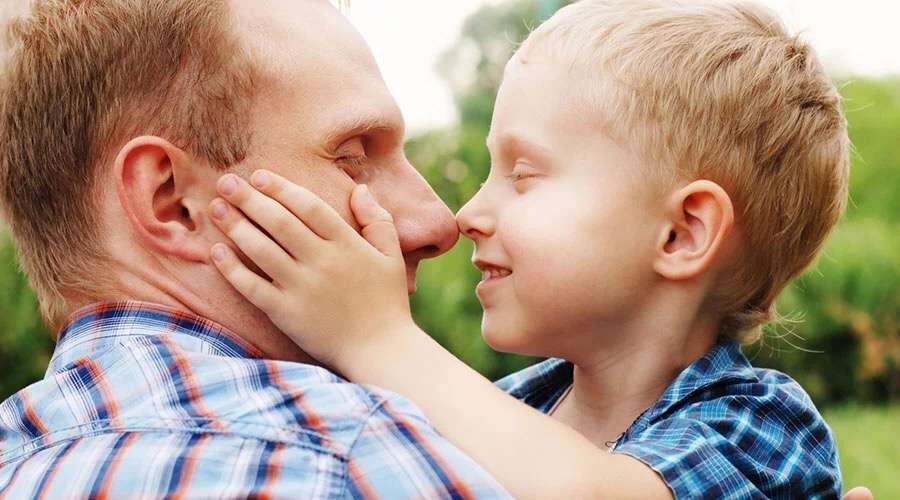
Some people say that any unlovable behavior is calling for love.
Indeed, when a child loses his temper, cries and asks for a hug, it is all a signal that the child sends to us [asking for attention]. Only when the child is fully hugged can he not feel uneasy because of lack of love.
Clearly, children who can walk must [beg for a hug] in front of their mothers when they are not tired. Psychologists call this kind of behavior [retrogression]:
When children feel stressed or anxious, they will give up the skills they have acquired and deal with them in primitive and childish ways.
This kind of situation is more common in families with two children.
Writer Long Yingtai also wrote such a thing in < < Children, take your time > >:
After the second child Feifei was born, the eldest brother Anan became more and more troublesome. When it was time to brush his teeth, he did not brush his teeth. When it was time to eat, he also whined not to eat.
To this end, Long Yingtai was once mad. She even said flustered and frustrated:
From getting up, dressing, brushing teeth, washing face, eating… everything takes me 30 minutes to do-how can I stand you?
But on one occasion, she uncovered the quilt and found an’an with tears on her face. The pillow was wet and she did not speak. Long Yingtai knew that at this time, language was meaningless except hugging.
So she quickly picked up Ann and hugged her in her arms like a baby.
At this moment, An’an said that seeing her mother holding her younger brother was that her mother loved her younger brother more.
Long Yingtai hugged Anan tightly at the moment, so far he has a better understanding of the child who was originally [able to brush his teeth] and [able to eat] but always did not cooperate and suffered from retrogression in behavior. He just wanted his mother to pay more attention and love him.
At this time, the baby just wants to return to the time when he was still a little baby, to experience the feeling of nestling in his mother’s arms again, to listen to her mother’s heartbeat most clearly, and to get the kind of comfort and love from her mother when he was a child.
There is no what in this world that has more healing power and warmth than her mother’s hug.
Mother’s embrace is more important than food.
One of the famous psychological experiments [rhesus monkey experiment] [substitute mother experiment] also confirmed that mothers with soft arms are more attached to their children.
In the same room, the experimenter placed a mother puppet monkey who could not provide milk and a mother iron wire monkey who could provide milk to observe the performance of the little monkey.
The study found that the little monkey hugged the mother of the puppet monkey most of the time and only went to the mother of the iron wire monkey to find milk when hungry.
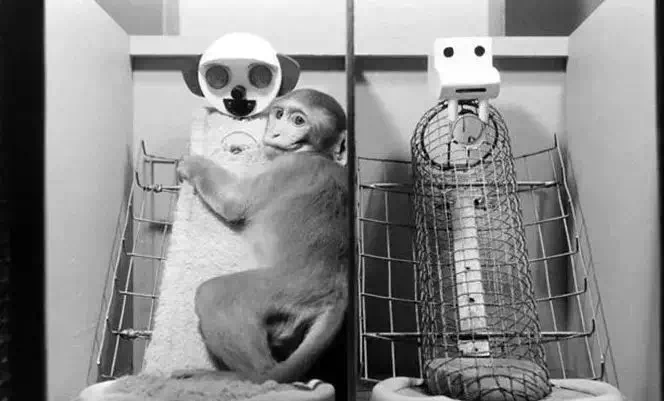
Moreover, when the experimenter put some [terrible] invaders into the room, such as the drumming bear and the little monkey, after being frightened, they all ran to the mother of the puppet monkey until they calmed down in the arms of the mother of the puppet monkey.
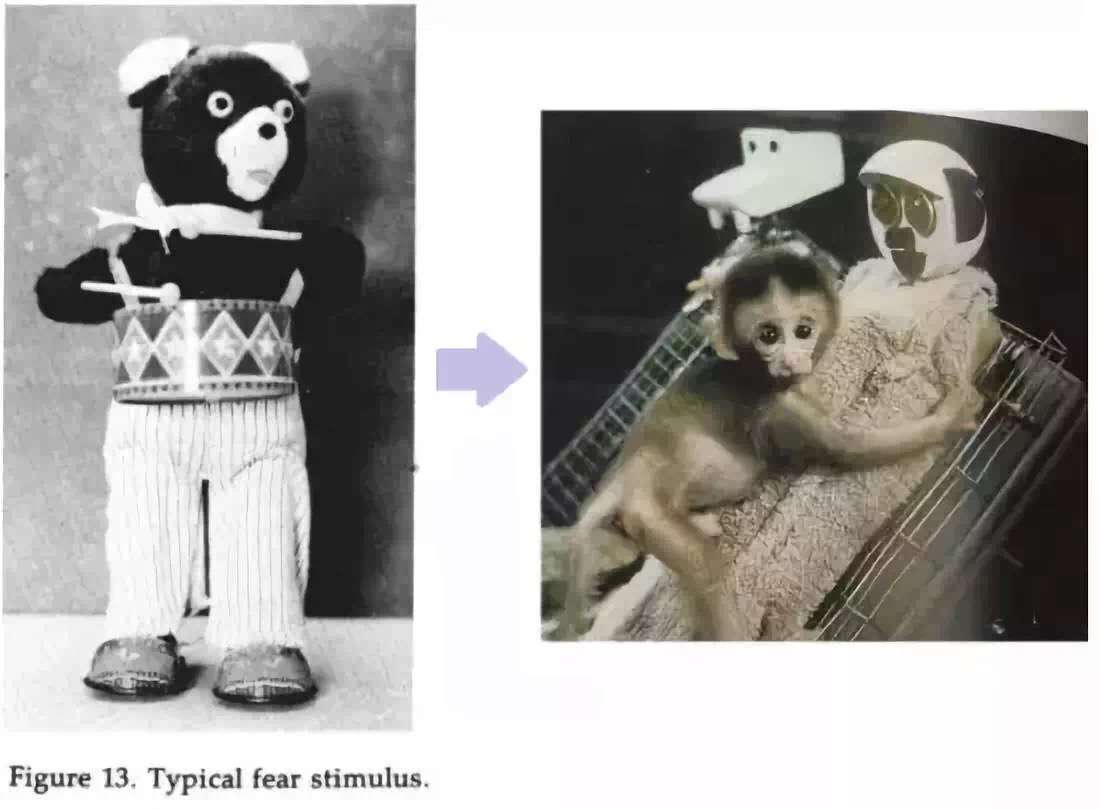 Photo Source: Rhesus Monkey Experience
Photo Source: Rhesus Monkey Experience
Rhesus monkeys and humans have 94% gene homology.
The child’s thirst for his mother’s embrace is actually very similar to the little monkey’s demand for the puppet mother. The mother’s timely embrace is the source of children’s security and even courage.
The time we hold the baby may be only a few years.
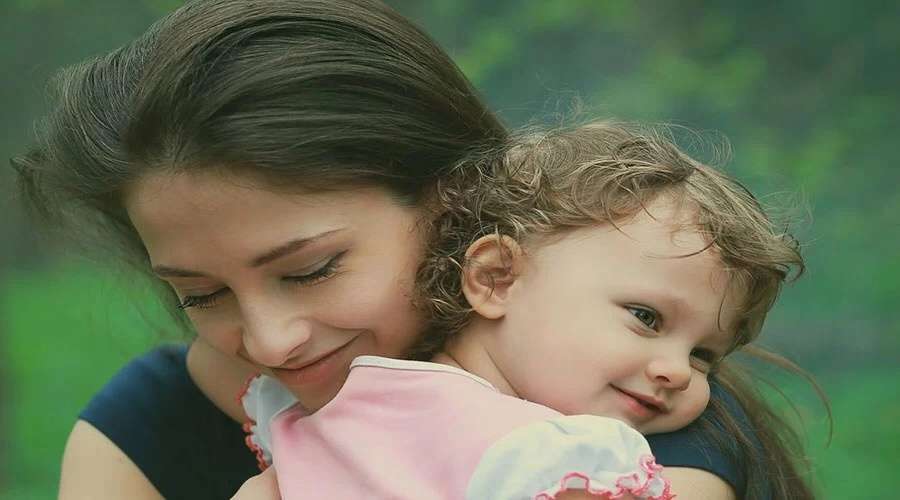
Some people may think that children should learn to be independent, we should learn to let go and not dote on them. But in fact, hugging does not mean doting on them. Don’t rush to push away children who need warmth.
It is instinct for a child to attach himself to his mother, and when the child grows up, you may not have a chance to hug him.
In variety show < < Life of Desire > >, Huang Lei once talked about such a small matter.
One night, Duoduo and his mother slept in the same bed. He wanted to call Duoduo back to his small room, but later he thought, it is better to carry Duoduo back.
But when he hugged a lot, he suddenly felt that it was easy to hold it, but it was no longer easy to put it down.
Huang Lei deeply sighed with emotion in the program: [Even if the matter of holding the daughter is over.]

Time flies. I was still a little baby in my arms before and grew up in an instant.
If we can’t give the child a big hug when he needs us most, then we can only look at his back and sigh [don’t chase] when the child goes away.
Thought of here, I can’t help but tightly hug the growing son around me, want to hold his face and solemnly tell him:
[Mom will always open her arms, whenever you want to.]
